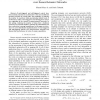Free Online Productivity Tools
i2Speak
i2Symbol
i2OCR
iTex2Img
iWeb2Print
iWeb2Shot
i2Type
iPdf2Split
iPdf2Merge
i2Bopomofo
i2Arabic
i2Style
i2Image
i2PDF
iLatex2Rtf
Sci2ools
CDC
2008
IEEE
2008
IEEE
On event-triggered and self-triggered control over sensor/actuator networks
— Event-triggered and self-triggered control have been recently proposed as an alternative to the more traditional periodic execution of control tasks. The possibility of reducing the number of executions while guaranteeing desired levels of performance makes event-triggered and self-triggered control very appealing in the context of sensor/actuator networks. In this setting, reducing the number of times that a feedback control law is executed implies a reduction in transmissions and thus a reduction in energy expenditures. In this paper we introduce two novel distributed implementations of event-triggered and self-triggered policies over sensor/actuator networks and discuss their performance in terms of energy expenditure.
CDC 2008 | Control Systems | Self-triggered Control | Sensor/actuator Networks | Traditional Periodic Execution |
| Added | 29 May 2010 |
| Updated | 29 May 2010 |
| Type | Conference |
| Year | 2008 |
| Where | CDC |
| Authors | Manuel Mazo Jr., Paulo Tabuada |
Comments (0)

